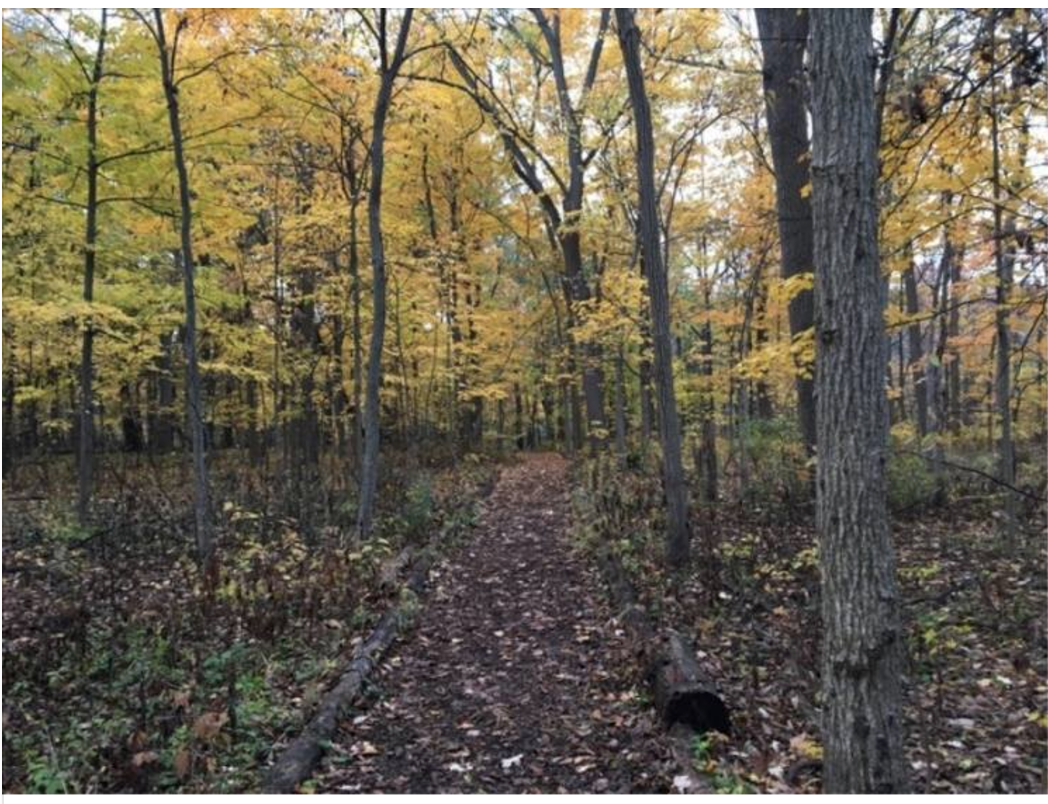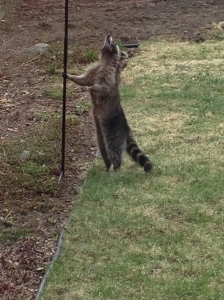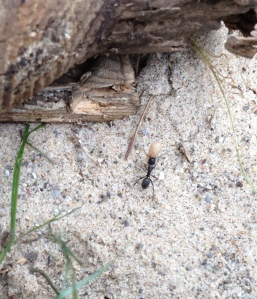(Sermon given at the Universalist Unitarian Church of Farmington on April 3, 2016.)
 Science is a way to call the bluff of those who only pretend to [have] knowledge. It is a bulwark against mysticism, against superstition, against religion misapplied to where it has no business being. If we’re true to its values, it can tell us when we’re being lied to. It provides a mid-course correction to our mistakes. (Carl Sagan)
Science is a way to call the bluff of those who only pretend to [have] knowledge. It is a bulwark against mysticism, against superstition, against religion misapplied to where it has no business being. If we’re true to its values, it can tell us when we’re being lied to. It provides a mid-course correction to our mistakes. (Carl Sagan)
Knowing and belief. Science and religion. As Unitarian Universalists, we hold religion and science far from one another. We say that religion doesn’t belong in science, and, if we’re true to our dedication that everyone has the right to their own search for meaning, we don’t impose our science onto someone else’s religious beliefs. For example, we hold, arms outstretched, our understanding of how humans evolved from earlier primates in one hand, while our beliefs about whether a god cares about our existence in the other.
Just as we hold those domains to be separate, insisting that the realm of science be clear of the realm of religion, we often confuse our ways of knowing in science with our ways of believing religiously. We cup those ways together, mixing them and using them indiscriminately, undoing that separation out of carelessness and simple human nature.
Today, I’ll explore understanding in two realms — science and religion. I’ll tease out belief, which loves to pose as knowledge but isn’t. It may be a way of understanding, but it should never be confused with knowing and knowledge. I’ll explore knowing of a particular kind – the scientific kind of knowing. I’ll also sit with uncertainty and its relationship to science and to religion, as it drives both.
Let’s start with what science is. Science is, according to Dr. Bruce Railsback of the Geology Dept of the University of Georgia, “…the concerted human effort to understand, or to understand better, the history of the natural world and how the natural world works, with observable physical evidence as the basis of that understanding. It is done through observation of natural phenomena, and/or through experimentation that tries to simulate natural processes under controlled conditions.”
Let’s start in the middle of that definition. Science involves the observation of natural phenomena. It’s using the senses to attend to the details of the universe. The twinkling stars above. The scurrying ants below. The breeze on our face. The evidence of the passage of time and the aging of our bodies. Science involves observation of both the untouched, natural world and of the manipulated world (experimentation), but the starting place is unadulterated observation.
So science is watching the chickadee eat, noticing their preference for one thistle feeder over the other. It’s about observing many chickadees over many days. It’s about noticing that the sun appears in the same direction every morning, but depending on your latitude, not at the same time each morning. It’s about watching person after person succumb to smallpox, as Edward Jenner did in the late 1700s, hearing from others and noticing himself over many years, that milkmaids, who often developed the mild disease of cowpox, rarely suffered the deadly smallpox.
There is a level of knowing that occurs with observation. I know that the chickadees in my yard prefer the feeder in the front yard because the thistle seed vanishes far faster from that feeder with its perches than it does from the mesh feeder in the backyard. I know the sun appears in the same direction every day, at least for my lifetime, because I’ve seen it do so for the well-over forty years of my life. And Jenner knew that, in the population he observed, milkmaids rarely contracted smallpox.
So observation leads to some level of knowing — a conditional knowing, a descriptive kind of knowing limited by what has been seen. Alone, an observation tells us very little, or at least often less than we think it does:
Three people were traveling by train through Scotland when they saw a black sheep through the window of the train.
“Aha,” said the first with a smile, “I see that Scottish sheep are black.”
“Hmm,” said the second, “You mean that some Scottish sheep are black.”
“No,” said the third, a scientist, glumly, “All we know is that there is at least one sheep in Scotland, and that at least one side of that one sheep is black.”
Science, however, doesn’t end with the observation of one side of one sheep or the position of the sun from one spot on the Earth, but observation is at the heart of all science. It is, as Dr. Railsback notes, the basis of understanding, but it is not alone science. Faced with data from observations, we start to ask questions. Why do these chickadees prefer one feeder over the other? Why do we see the sun in the same place each morning? Does the mild disease of cowpox, common to milkmaids, somehow really protect them against the deadly smallpox?
It’s these questions that lead to more thought, more observations, and, perhaps, an eventual hypothesis. A hypothesis is often defined as an educated guess, but that sells short the work that goes into creating a hypothesis. Rather a hypothesis is based on multiple observations paired with previous scientific knowledge. It’s a proposed answer to a question about what’s been observed. We have to be careful when we hypothesize, for it’s tempting to become attached to these so-called educated guesses. When we hypothesize, we aren’t stating knowledge. We’re stating possible connections that need to be tested and very well may not hold up to testing. That’s tricky, because as humans, we want our guesses to be right, as it just feels good to be right.
The chickadees like the feeder in the front yard because it has perches, allowing them a more secure stance when eating. Something about having cowpox makes smallpox a milder disease, so giving someone cowpox might be a way to prevent smallpox deaths.
Hypotheses are small steps. They are testable steps. They lead to experimentation which, per Railsback, “…tries to simulate natural processes under controlled conditions”. Experimentation yields more observations and more data. And it yields more questions. A hypothesis that proves false is just as valuable to science as the one that is proven true. The feeders’ positions are switched, and the chickadees continue to dine from the front yard feeder, the one with metal mesh and no perches. The hypothesis is unsupported — location of the feeder seems to matter more than the form of the feeder. Jenner innoculates a 9-year-old boy with cowpox from a milkmaid’s pustule, resulting in a mild illness with no rash, and, a few months later, he innoculates the boy with smallpox. The child remains healthy. The hypothesis is supported– infection from cowpox did seem to protect the child from smallpox.. Either way, hypothesis supported or not, the next step is another hypothesis and more experimentation.
Now, not everything is easily testable by experimentation. Some systems are beyond our ability to control conditions, leaving us with finding ever-more sophisticated ways to observe. Our understandings about the universe and its laws and age unfold because we learn to observe differently while developing new ways to observe. We smash particles together and watch the fallout, for example. Our knowledge about how life began and diversified on Earth is also observational, relying on fossil-hunters and increasingly sophisticated methods of determining the age of those fossils.
When does that cycle of observing and often experimenting stop? It doesn’t. After many experiments and accumulation of data from many sources, we start talking about knowing in a scientific way. We are the best scientists when we keep in mind that we still don’t know much, and that our current knowledge is limited by the accuracy of its mode of discovery, the tools and technology of our time, the integrity of this scientific process, and the creativity and insight of those observing and asking questions. The scientific method of observing, questioning, hypothesizing, and experimenting is not flawed, but we are. We are prone to bias. We prefer not to be wrong. We see correlation and assume it is causation. We see patterns when none exist and miss patterns where they are present. We reach, seeing what’s not there, because we are so desperate to know. We make mistakes.
So, then, if we make mistakes, what is knowing in science? Knowing starts with observation and is furthered by repeated experimentation. It’s driven by data collected by those looking for fact and truth. (Hope and conjecture have no role in science. Anecdotes aren’t science either, for as the adage goes, the plural of anecdote is not data.) Knowing in science can mean understanding a theory, one of the big, broad theories such as those about evolution or gravity or germs. It can also mean understanding, as well as current research allows, the mechanisms behind the disorders and diseases that cause us to suffer and, at some point, to die.
Aside from the big theories and the basic mechanisms of action in biology, chemistry, the Earth science, and physics, knowing in science is tenuous and subject to change. We are perhaps most aware of this in medicine. Here’s an example from routine women’s health care:
Recommendations for calcium supplementation, self-breast exams, and pap smears have changed drastically in the twenty-two years I’ve been practicing medicine. When I started working as PA in family practice, we urged women to take 1200 mg of calcium daily to prevent osteoporosis, examine their own breasts monthly to check for suspicious masses, and get a pap smear annually to check for cervical cancer, starting at age eighteen. Observational studies followed by experimentation drove those recommendations, so most health care providers followed them. That is how medicine works. Large studies, preferably verified by other large studies produce reams of data that lead, after much discussion and dissention, to recommendations for practice.
Today, those recommendations have changed. Calcium supplementation is no longer routinely recommended for osteoporosis prevention, as it has a dubious role in preventing fractures while having a clear role in increasing kidney stones. While some women do find their own breast cancers, monthly self-breast exams did not save lives. Annual pap smears started very young led to over diagnosis of benign conditions and a corresponding unnecessary increase of the not-always-benign treatment for those conditions.
Was the science that drove those recommendations wrong? Yes and no. Yes, calcium plays a starring role in bone metabolism. Yes, women who notice a breast lump should see a doctor promptly. Yes, pap smears reduce the rate of death from cervical cancer. But because science is an ongoing process, and because doctors and scientists continue to question and continue to experiment, the book didn’t close on those issues in women’s healthcare. It stayed open, because that’s what science does. It remains open.
And that’s where uncertainty enters the room. No matter how much we know about the natural world, what we don’t know dwarfs that knowledge. The universe is vastly big, and our smallest bits of ourselves are so very, very small. We know so much. And so little. Science embraces uncertainty because without that uncertainty, without that examination of what is known, we would have no need to keep questioning and wondering.
Uncertainty in science is good. It is necessary. It is what brought science to be and drives science on. Without uncertainty, we remain frozen, without impetus to look again, without reason to wonder. We need uncertainty to move forward scientifically. But uncertainty can also drive us away from science, especially when science doesn’t yet have answers to our questions. The earliest people were uncertain when the moon eclipsed the sun, when stars changed position in the sky, when rains and winds brought death and destruction. They were uncertain why people died and how new life came to be. In that uncertainty, they built beliefs and rituals and stories. Before science had a codified process, uncertainty brought us religion, a way of understanding what we did not know and couldn’t explain.
I think we’d agree that the Jewish primary texts, the Torah and rest of the Old Testament, and the Christian primary texts, the Gospels and remainder of the New Testament, don’t explain the true origins of the world or explore the root causes of plagues, floods, or other natural disasters and wonders. Similarly, we don’t take as true the stories of the Hindu gods, with Brahma the creator, Vishnu the preserver, and Shiva the destroyer as actual forces in the natural world. We read these texts as history and literature, and while we may take those metaphors of creator, preserver, and destroyer to be meaningful representations of the process of our own birth, life, and death, we don’t confuse these with the actual forces of our natural world. We know those stories are stories, explanations from a time before the knowing of science.
But what about the god or gods or goddesses behind those pieces of historical literature? What are we saying when we say we believe in a god or goddess or an assortment of them? Belief is a trust, a confidence in something or some idea that is untestable and perhaps not even observable without generous interpretation. Some may believe in a deity who knows their name, who breathed life into them. Some may believe that an unseen deity protects them from harms, known and unknown. Some may believe that deity brings them trials and tribulations as tests of faith and devotion, or simply as ways to make them better people. And some believe that their loving, omniscient deity, giver of life, then calls them away from that life to something better — something unknown, unseen by anyone on Earth, somewhere where pain and suffering vanish and life never ends.
Whatever the narrative of the human life within that belief structure about the divine, it is a narrative designed bring comfort, order, purpose, meaning, and security. We all want those in our uncertain, unpredictable, sometimes chaotic and always finite lives. Belief in a divine force, something beyond ourselves and beyond the ever-evolving scientific knowledge of the world, can bring a sense of certainty to the uncertainty of our lives. Belief in a set of religious precepts ordained by an omnipotent God or beliefs in a single uniting force, connecting us all and giving us some power beyond our mortal limits, can help us manage the uncertainty of being human. Belief in forces outside our natural world can be amazingly soothing and helpful.
That’s where belief belongs. Belief is the language of religion. In that realm, it’s valid and sound, allowing one to hold close and valuable something untestable and ephemeral. While belief may lead a person to make seemingly scientific connections (the cancer vanished, so God exists), it should never — ever — be confused with the knowledge, however mutable, that science provides.
But, as I mention, we are uncertain, and we, as humans, are not so good at accepting that uncertainty. That’s what drives good science inquiry and, eventually, knowledge. It’s also what drives us to belief, the way understanding in religion when we should be in the realm of science.
Belief is a way of understanding the world, but it’s not appropriate to science or applications of science, like medicine. Uncertainty in the scientific realm — and especially the medical realm — can drive us to claiming knowledge in ways other than scientific ways. When medicine doesn’t provide clear relief from symptoms, we may turn to those anecdotes from a friend or the friend of a friend or some guru on TV. In our uncertainty and often our fear, we may become prone to follow fads and accept pseudoscience, sure that doing something — anything — is better than doing nothing. We cling to answers that go directly against the scientific process proven to be effective for over 400 years — simple answers, such as a specific diet or oil that cures everything. We read lists of symptoms from vertigo to fatigue, impotence to rashes, all linked to a single substance either used in excess or in deficit. Gluten and lyme disease and even vaccines get named villains for all that ails — while vitamin D and coconut oil become the new fountains of youth. (And, yes, gluten can be deadly to some and troublesome for others, and lyme disease is a real entity requiring medical intervention, but neither cause all medical woes, nor does Vitamin D or a fad diet fix all that ails us. And vaccines save lives. The World Health Organization attributes the measles vaccine alone to saving 17.1 million lives just since the year 2000 while not contributing at all to autism rates, according to numerous studies.) In the face of no clear answer or no easy answer, it’s easy to cling to what is not knowledge — It’s easy to cling to belief.
But we shouldn’t. Belief isn’t the language of science. It’s not how we know what is under our feet, over our heads, or in our own bodies. And if we’re serious about holding science and religion as far apart as we can, if we’re committed to understanding that knowing in science can never be preempted by the beliefs associated with religion, we cannot mingle these ways of understanding the world.
We hold science and religion apart because they are different domains in our post-enlightenment age. Science is built on observation, questioning, and experimentation. It requires constant uncertainty and scrutiny, testing and retesting, looking forward and backwards at the same time. It is a continuous process of uncovering knowledge that leads to more questions. It is about objective truths and the building of knowledge as understanding.
Religion also fills the void of uncertainty, but it fills it with belief. Untestable and often unobservable, beliefs may change across a lifespan due to experiences or new ideas or just need. Beliefs carry no burden of proof and offer comfort that, for some, lasts a lifetime unchanged. Belief is about that which touches our metaphorical hearts. Belief is personal, subjective, and entirely non-scientific. It can be what brings us comfort when nothing material, science or otherwise, can, but it should never be confused with the knowing that comes from science.
So here they sit, science on the one hand and religion on the other, arms stretched wide.
And here’s our ways of understanding, knowledge paired with science, belief sitting with religion.
May uncertainty be with you as you hold those realms apart.

 Tomorrow I’ll take to the streets of downtown Detroit to spend an hour or so walking a few miles with thousands of young people and not-so-young people in Metro Detroit’s
Tomorrow I’ll take to the streets of downtown Detroit to spend an hour or so walking a few miles with thousands of young people and not-so-young people in Metro Detroit’s 
 Science is a way to call the bluff of those who only pretend to [have] knowledge. It is a bulwark against mysticism, against superstition, against religion misapplied to where it has no business being. If we’re true to its values, it can tell us when we’re being lied to. It provides a mid-course correction to our mistakes. (Carl Sagan
Science is a way to call the bluff of those who only pretend to [have] knowledge. It is a bulwark against mysticism, against superstition, against religion misapplied to where it has no business being. If we’re true to its values, it can tell us when we’re being lied to. It provides a mid-course correction to our mistakes. (Carl Sagan I teach a facinating group of young teens and preteens how to write using resources other than their own opinions and previous knowledge. Together, we wrangle with essays written by the pros and debate the credibility and reliability of sources online and in print, and they write essays using those sources to support their well-considered thesis statements. However, teens and preteens glue themselves to an opinion tighter than Thomas the Tank Engine stickers adhere to oak book shelves, and this tenacity to ideas interferes with anything close to critical thinking or clear-headed writing. They seek for what confirms their bias and often discard what seems to be against it.
I teach a facinating group of young teens and preteens how to write using resources other than their own opinions and previous knowledge. Together, we wrangle with essays written by the pros and debate the credibility and reliability of sources online and in print, and they write essays using those sources to support their well-considered thesis statements. However, teens and preteens glue themselves to an opinion tighter than Thomas the Tank Engine stickers adhere to oak book shelves, and this tenacity to ideas interferes with anything close to critical thinking or clear-headed writing. They seek for what confirms their bias and often discard what seems to be against it.




